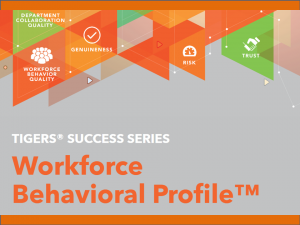 Change is an inevitable part of business operations. Many people are resistant to change, however. They will meet any new initiative with resistance when trust is low, says Employee Engagement, Retention & Growth. If change is one of your initiatives, leverage trust for employees to champion change as your first goal.
Change is an inevitable part of business operations. Many people are resistant to change, however. They will meet any new initiative with resistance when trust is low, says Employee Engagement, Retention & Growth. If change is one of your initiatives, leverage trust for employees to champion change as your first goal.
In order for any new change initiative to be successful, employees must be fully on board. The quicker they are, change initiatives move smoothly. If employees are not on board, desired change will occur slowly over time. This may not fit your desired or necessary timeline. This is because change is resisted, which is the direct opposite of championing change. Many times, the root cause of this resistance can be found in the amount of trust within your organization.
Trust is one of the six TIGERS® principles required for high performance business cultures and teamwork. The other are interdependence, genuineness, empathy, risk resolution and success. However,it is trust that produces employee confidence in the integrity, honesty, reliability and fairness of a person or organization. Essentially, employees learn to trust you and other team members when everyone does what they say they are going to do, when they say they are going to do it. It requires confidence in management ability, fairness and transparency.
Trust is measurable in the way that all employees treat one another and this includes how managers treat one another and employees. When it is present, harmony, creativity, commitment and the ability to move forward swiftly are natural outcomes. If trust is lacking within your organization, there are several team building strategies that you can implement to improve your company’s trust culture.
Know your team before expecting anyone to leverage trust.
 A strong workplace culture starts with your employees. In a healthy work culture, employees want to be passionate about their positions. They are also looking for personal and professional development. This means that they want to be coached on how to do better. This does not happen in an annual review.
A strong workplace culture starts with your employees. In a healthy work culture, employees want to be passionate about their positions. They are also looking for personal and professional development. This means that they want to be coached on how to do better. This does not happen in an annual review.
Employees desire regular feedback in the important performance areas. If you don’t know where your team members currently stand, then you can’t help them improve.
One great place to start is with the TIGERS Workforce Behavioral Profile™. This culture and group behavior assessment offers three survey runs for the same company. It can also be broken down into departments. This means change initiatives can be monitored over a 3 year process so you know how to fine tune workforce behavior improvement.
The behavioral profile starts by assessing six principles that impact existing group cooperation and high-performance team behavior. Then it shows you through two comparison assessments how and where change has occurred and where to focus next. In addition to trust, the assessment also shows where your actionable and measurable direction is to improve and track progress in the area of the other TIGERS principles of interdependence, genuineness, empathy, risk and success.
Leverage trust is a two-way street.
Trust does not exist in a vacuum. For trust to thrive within your organization, it needs to be reciprocated in order for employees to champion change.
For employees to fully trust leaders, employees need to take risks within their positions without fear of being reprimanded, humiliated or terminated. This is especially true when change disrupts habitual ways things are done.
The willingness to take risks can only occur in environments where team members feel safe. This means that if employees are to fully embrace change, they must feel safe within the organization that mistakes and looking awkward do not impact their performance review, advancement opportunities or revenue. Once emotional safety occurs, team members can then become innovative and creative, and forward-thinking to champion change.
Strong communication is essential to leverage trust.
Communication is at the heart of trust. When communication is lacking, trust usually is as well. Trust is a relational concept where open, honest and timely communication supports people’s decision to trust. Lack of communication, for example, creates suspicion.
People are not perfect. Mistakes are a part of everyone’s story. Even strong leaders and top CEOs make mistakes.
When mistakes are downplayed or hidden, employees view this as a cover up and start to wonder what else their leaders are hiding. Trust starts to diminish. Change s-l-o-w-s.
In order to promote a work environment to leverage trust, leaders require strong communication skills. They must share all important information with their team members, no matter if that information is good or bad.
When communication is seen as important and leaders are transparent and open with their team members, trust builds and team members are more likely to stand behind their leaders, even when mistakes occur. And the sentiment is typically reciprocated.
Leverage Trust and Change Review.
Change initiatives are inevitable in business. When you want your plans to be successful, your employees need to champion change initiatives. Employee hesitation and resistance often comes down to how much trust is within your work culture.
Trust is a key component for any successful work culture. It is critical for change initiatives to be successful. To leverage trust within your organization, first know where trust lands among your team members and work culture environment. It is also good to know how interdependence, genuineness, empathy, risk and success also score.
Ultimately trust is a two-way street and employees must feel safe enough to take risks without fear of repercussions. Communication is also vitally important for employees to feel in-the-loop and that you are worthy of their trust. With these, and other, team building strategies, leaders can promote trust within their organizations to champion change.
Care to dig deeper into this leverage trust conversation?
Consider the following resource to add to the trust and champion change conversation:
- Employee Engagement, Retention & Growth. Crampton, Dianne. Championing Change, pg. 7-19. Three Creeks Publishing (2012).
- TIGERS Workforce Behavioral Profile
- The Importance of Building Trust
- The Decision to Trust
Copyright TIGERS Success Series, Inc. by Jennifer Zimmerman
About TIGERS Success Series Group Norm Facilitator Training
 TIGERS Success Series provides a Manager Facilitator training with a tool box that engages employees to identify the group norms that improve both department and company work culture. It helps organizations to re-engage employees, resolve conflict behavior and builds work relationships. These same resources and tool box can be used to onboard new employees and contractors onto existing teams so behavior is understood and normalized from the get-go. The training and tool box are brought to you when eight or more of your managers are enrolled.
TIGERS Success Series provides a Manager Facilitator training with a tool box that engages employees to identify the group norms that improve both department and company work culture. It helps organizations to re-engage employees, resolve conflict behavior and builds work relationships. These same resources and tool box can be used to onboard new employees and contractors onto existing teams so behavior is understood and normalized from the get-go. The training and tool box are brought to you when eight or more of your managers are enrolled.